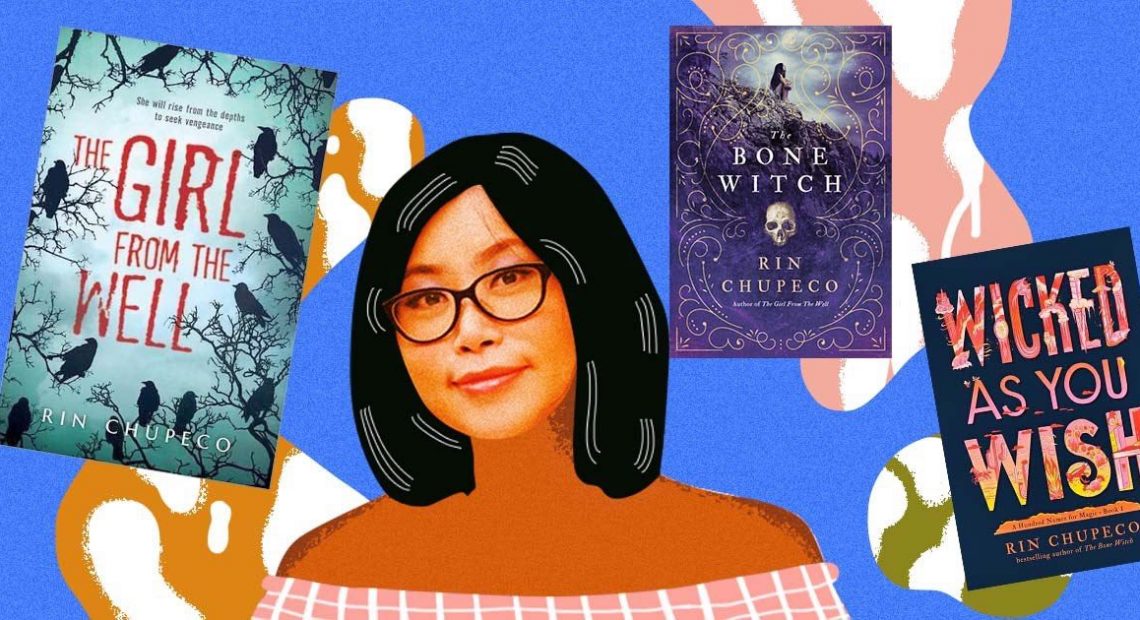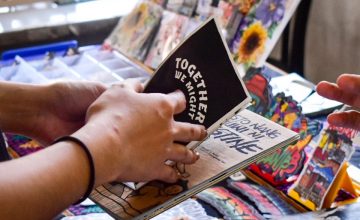It was the YA novel boom of 2013. I’d pick up a dystopian book, glance at The New York Times Bestsellers, hoping to be on that list too.
With a draft at my disposal, I browsed numerous author FAQs and had a whole directory of literary agents. At one point, I’ve committed to heart the step-by-step to getting published: 1) Polish the manuscript and don’t send it until you’re satisfied; 2) Write a strong query letter that will have agents begging for sample chapters; 3) Get a literary agent; 4) They find a willing publisher, and the next thing you know, you’re sitting at the adaptation’s movie premiere beside Kate Winslet.
But even with that plan laid out, I wasn’t a New Yorker who could set up coffee dates with prospective agents. While writers no longer have to snail mail a manuscript, publishing internationally involves studying legal jargon and working logistics while you’re halfway across the globe.
For authors like Rin Chupeco, it’s a day-to-day reality. The Manila-based author has penned several fantasy and supernatural stories including “The Bone Witch” trilogy, a series on a necromancer learning to master her seemingly cursed powers. Last month, Chupeco released a new novel that follows her roots in dark worlds: “Wicked As You Wish,” led by Filipino heroine Tala, a descendant of Maria Makiling who joins forces with the Prince of Avalon.
Despite being set in otherworldly environments—and marketed for an international audience—her worldbuilding’s lifeblood is Asian culture. There’s the Bone Witch that finds its roots in the mangkukulam, “The Girl in the Well” inspired by the Japanese ghost story “Bancho Sarayashiki,” as well as tales of Philippine lore in her short piece, “Kapre: A Love Story.” As one of the few Philippine-based authors published abroad, she weaves her stories with a distinct locality, cloaked with some universal truths.
In this interview, we talk to Rin about querying agents, the international publishing scene and how she fuses Filipino narratives into her stories, wherever her books may go.
Hi, Rin! What’s a regular workday like for you? How do you begin your writing process?
Normally, I would wake up around 5:30 or 6 a.m. and spend the next 30 minutes or so staring up at the ceiling, not really thinking about anything at all. I find that when you’re relaxed and not dwelling on the stuff you have to do for that day, ideas flood into your head whether you want them to or not. I often get concepts for new projects this way, or better, improved ideas for books I’m currently working on.
A lot of writers get stuck in the limbo between thinking a draft is ready and having second thoughts. How do you know when a manuscript is ready to go for querying?
If you’re a writer, you’ll always think that your manuscript will never be ready for querying because that’s how impostor syndrome works. You think you suck and there are so many other writers out there better than you anyway and what if this draft is bad and everyone laughs at you because you just really, you know, suck? And that’s an absolutely normal thing to feel as an author. Anxiety over whether or not your books are good enough is actually proof you’re a writer. But that means you’d rather keep revising the manuscript because there’s always gonna be something to nitpick, and it’s difficult to let go. And I wish I had a universal answer to that problem—if it was that easy, everyone would be writing a book.
The best advice I can probably give is to trust your initial gut instinct. Querying and getting rejected doesn’t mean you’re banned from submitting it again to another agent.
The best advice I can probably give is to trust your initial gut instinct. Querying and getting rejected doesn’t mean you’re banned from submitting it again to another agent. You’ll have many more chances even if you’d been rejected a lot. I’ve racked up several rejections before landing my agent, and that doesn’t mean my work was bad—it just wasn’t those other agents’ preference. If you know you have a draft worth reading, and understand that you have the humility to accept criticism and improve if necessary, then you’re ready to submit. It’s going to be scary, but push through and take that step anyway. The ones that are always confident that their works are the world’s next great novels are usually the ones that aren’t very good.
Read more: How I wrote a whole novel in 30 days (without the panic)
Can you tell us how you first met your agent? What was querying like for you?
“Wicked As You Wish” was the first book I actually queried. It went through a lot of rejections, and a few revise-and-resubmit emails that basically asked me to change my Filipina protagonist into a white character. I was briefly tempted because I felt desperate, then came to my senses and said no way, then shelved the book.
I wrote “The Girl from the Well” in the next couple of months after that—very, very pettily, because I deliberately wrote it so that my protagonist could not be anything but Asian—and it did a lot better, getting more manuscript requests than rejections. In the end, it boiled down to three offers.
One of the agents, Rebecca Podos, was the first to offer me representation. We talked on Skype, and one of the things she said was “You know, I know you’re pitching this as a YA psychological horror, but I can’t help but feel that this is also a love story. Not a romance, but a love story.” And she was right. She really got the book. And I talked to the other two agents but didn’t feel like they made the same kind of connection. And that’s how I chose Rebecca, and she’s been my agent since 2012. That’s the kind of thing you want to look for in an agent—not how many followers they have on Twitter, but how well they understand the book you’re pitching to her.
If you know you have a draft worth reading, and understand that you have the humility to accept criticism and improve if necessary, then you’re ready to submit. It’s going to be scary, but push through and take that step anyway.
What are some stumbling blocks for a Manila-based author publishing internationally?
Time zones are terrible. New York is usually 12 hours behind Manila time, so I’ve had to take 2 or 3 a.m. calls because that’s what agents and editors and publicists can schedule me in for. One time I was on a book tour in California but still jet-lagged on Manila time, with people from Illinois, NYC and Boston in the Skype conference. Daylight savings had to be factored in. I felt like I was on three time zones at once and kept messing up when I was supposed to call in.
Another difficulty is not being able to go on book tours and literature festivals in the US as often as US-based authors can. While publishers will usually comp your meals and lodgings while you’re in the US, they can’t always pay for your international flight (it’s sometimes the house policy) which means you’ll have to shell out for that. I’ve been to a few cons since and have been invited for more while taking advantage of cheap flights, but I will say that if you can’t afford it, it’s not necessary. Finishing your books and meeting your deadlines are more important.
It is worth saying though, that most agents and publishing houses won’t discriminate if you tell them you live in the Philippines, or if English isn’t your first language. They’re mainly interested in your books. If they like them well enough to offer you representation or a book deal, where you’re from doesn’t matter. I’d always thought that might be a factor when I was still querying, but with the agency and the publishing houses I eventually signed with, that was barely a focus.
Read more: 5 writing tips from Marvel alum Marjorie Liu
There are distinctively Asian influences in your novels. Is there a secret to successfully marketing it to an international audience?
There’s no real step-by-step process. It’s really all about your own storytelling style and your writing. It’s not necessarily easy; a lot of US readers are used to white-centric or American-centric stories, and there is some resistance when they’re not familiar with Asian writing tropes if they take center stage in a novel.
But I’d decided very early on, after the whole fiasco with querying “Wicked As You Wish,” that I was gonna stay true to my roots and keep writing Asian characters into my stories. I didn’t want to write Chinese or Filipino characters that acted like white characters. I wanted to write characters based on my own background and experiences, and it matters that I’m showcasing Tagalog dialogue in my books, or having Filipinos as protagonists with the attached families and oddball humor.
I don’t want to write Pinoys because Filipino issues play a significant role in my books, but because I just want to write Pinoys slaying dragons and fighting bad guys and being teens. Western readers do prefer familiarity in books, so that’s the hurdle I’m constantly trying to overcome. But the more books like these are out there, the more familiar they will become. And that’s my objective.
I wanted to write characters based on my own background and experiences, and it matters that I’m showcasing Tagalog dialogue in my books, or having Filipinos as protagonists with the attached families and oddball humor.
What’s your advice for young Philippines-based writers who want to get their foot in the door of international publishing?
It’s about time to shuck off the notion that living in the Philippines or being Filipino means your works are of lesser quality than American writers’. It really isn’t. Shoot your shot. What you all should do though, is do the research. Look at the steps you’ll need to do to query your books. Read agent profiles online to find out what kind of books they want to represent, and do not pitch a book that is not a genre they want. Do not badger them if they say they’re currently closed to queries. Follow the rules. Googling “how to query” will give you a list of instructions, most from agents themselves, on what to do. Do not adopt the “Bahala na si Batman” attitude here. Batman isn’t going to help you, he’s on quarantine now, too. If you break an agent’s querying policy, they won’t read your manuscript no matter how good you think it is. They receive hundreds of queries a day; one query letter where they can see that the writer didn’t do the research is one less query letter they’ll have to read.
I’ve also made it a point to try and help Filipino authors with any querying questions or concerns they might have. I’m @RinChupeco on Twitter and my DMs are always open if you need help. I’ve also done meetups in the past with other writers who are interested in exploring US traditional publishing, and hope I get to do more of those to help authors with queries and manuscripts.
Art by Kristine Paz-Yap

























Comments